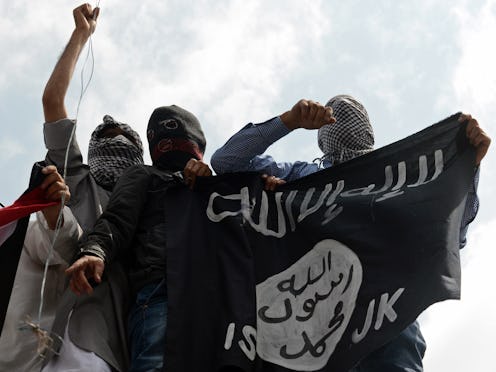News
Could ISIS And Al Qaeda Ever Join Forces?
It's been more than a week since ten people were killed in an armed massacre at the offices of French newspaper Charlie Hebdo , an act of terrorism which has captured attention and sympathy from all across the world. And on Wednesday, after an initial whirlwind of uncertainty — could this have been ISIS? — we got the first public statement claiming responsibility for the attack from Nasr al-Ansi, a top commander for Al Qaeda in the Arabian Peninsula (AQAP). And if you've ever wondered whether ISIS and Al Qaeda could unite into one terroristic supergroup, suffice to say this declaration from the latter carries some interesting implications.
This isn't the first time that Al Qaeda's involvement in the Charlie Hebdo attack had been in the news — late last week, the AP reported that a source within AQAP confirmed their involvement. But the new statement from al-Ansi is significant for what it implies not just about the attack itself, but about the tense relationship between the terrorist group and its upstart younger sibling (ISIS was formed primarily out of Al Qaeda in Iraq, back in 2004). Specifically, while claiming responsibility for the Charlie Hebdo attack, al-Ansi also denied that the group had anything to do with the killings of four French Jews in a kosher deli on Friday, though he did speak of it in approving terms.
That clarification may speak to the fractured relationship between ISIS and Al Qaeda at present, which is probably one of the few positive things one could say about this whole situation. Observers have feared the possibility of ISIS an Al Qaeda forces reaching some widespread state of collaboration in recent months, and for very good reason — ISIS' domination of swaths of Iraq and Syria is undeniable, and they boast many foreign citizens among their ranks. Al Qaeda, on the other hand, has the cache that over a decade of warring against the United States brings, and a robust international network, with established branches into India and Africa.
While at least one witness to the Charlie Hebdo attack said a gunman credited Al Qaeda's Yemen branch, the case of the kosher deli is quite different — that suspected gunman, Amedy Coulibaly, left behind a video of himself apparently pledging allegiance to ISIS and its leader, Abu Bakr al-Baghdadi. Coulibaly, who was slain by police after his alleged lethal assault, spoke to the camera in front of the flag of the Islamic militant group, a rifle at his side.
ISIS well and truly split from Al Qaeda back in February of 2014. Among other things, the group wasn't willing enough to follow the orders of Al Qaeda chief Ayman al-Zawahiri, with its forces behaving insubordinately, spurring the split. Since then, however, ISIS has undeniably been the more visible and discussed of the two, with Al Qaeda's prominence and relevance, at least as reflected in media coverage, on the wane. There were concerns in late 2014 that a reunification could be in the cards, amid reports that the two sides had discussed teaming up against United States-backed rebels in Syria.
But at the very least, it seems like the large-scale organizations are still at odds, at least enough to insist we get the who's who in international terrorist incidents right. Al-Baghdadi claims to be the leader of a worldwide caliphate, after all, so it's no surprise he wouldn't want to share the limelight, and Zawahiri is seemingly no stranger to a wounded ego, either. At this point, it's surely best for all innocent bystanders to hope that these deep divides stay right where they are — however frightening each is on their own, a reuniting of ISIS and Al Qaeda would be awful news for basically everyone, except them.
Image: Getty Images
